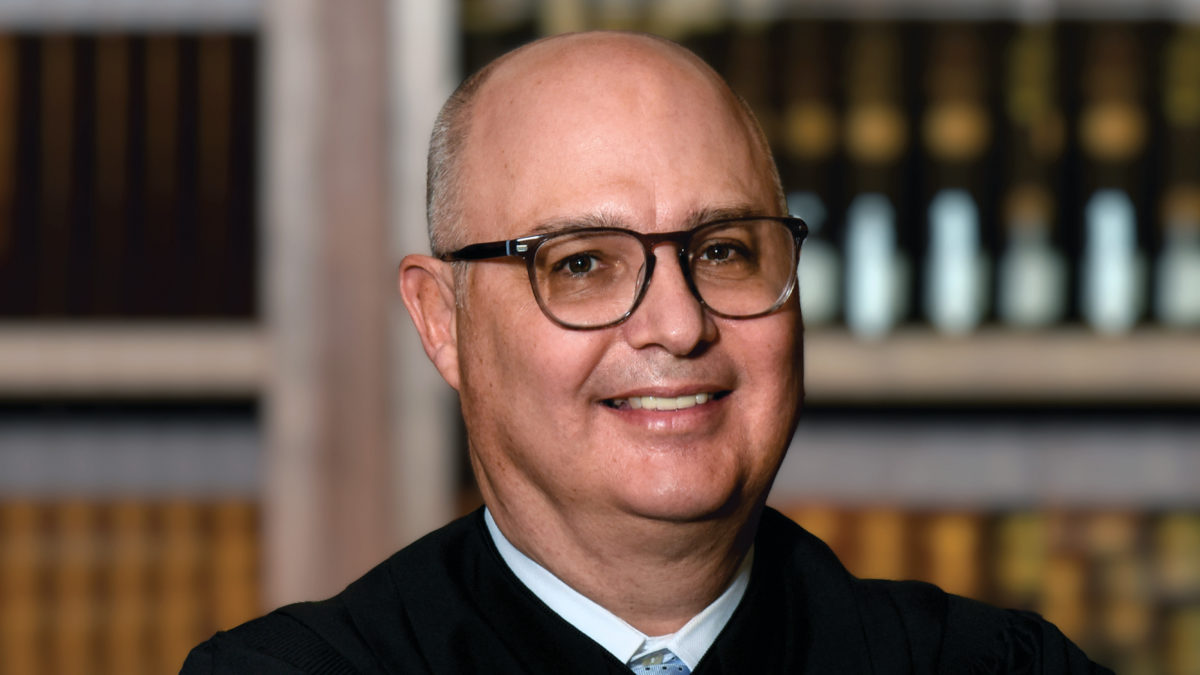
Progress and Next Steps for the Judicial Branch
October 2023
Download This Article (.pdf)
In January, my revival of the Chief’s Corner column focused on the results and recommendations of two outside investigations completed last year. In that article, I promised future updates on the Judicial Department’s efforts and initiatives. We want to do a better job of sharing what we’re doing and why, because it’s critical for the public to have confidence in our operations.
This article details our ongoing efforts to improve. My goal is for every employee and judge to be proud to say they work for Colorado’s judiciary. I want everyone to connect to our mission, to feel supported in the workplace, and to have every tool they need for success in their work. I want Colorado to be a national leader not only in the administration of justice, but also in workplace culture and employee support. We’re making great progress on these fronts. We believe in this work, and we believe that we can make Colorado’s judiciary even better.
Core Administrative Operations
Over the last few years, the Department has overhauled its contracting, procurement, and leave practices to better align with the executive branch. This past year, outside investigations revealed additional opportunities to improve our rules and policies related to core administrative operations. Adopting those recommendations, we have further strengthened our fiscal controls, human resources (HR) fundamentals, and workplace reporting procedures.
Workplace Culture Initiative
This past year, the Supreme Court created a Workplace Culture Initiative (WCI). We wanted the WCI to develop a plan for long-term cultural improvements in the Judicial Department and tackle issues that can’t be corrected by a simple policy or rule change. Every expert we spoke to in this process underscored that true culture change and culture improvement takes sustained commitment and years of focused efforts. Justice M rquez and Justice Berkenkotter have headed the WCI efforts with the heavy involvement of employees and judges around the state. We must have understanding and buy-in from everyone affected. The entire Supreme Court, every judicial district, and the State Court Administrator’s Office are committed to long-term improvements.
Through the WCI, the Department has undertaken a number of reforms, and many more are in progress. The WCI is the engine behind statewide changes at the Judicial Department to foster an exemplary workplace driven by employee voices, a shared mission and vision, and common values and priorities. Core principles of the WCI include:
- a shared recognition that everyone (customers and employees) should be treated with respect and dignity;
- a shared commitment to transparency, accountability, and ethical decision-making; and
- a shared understanding that we will not tolerate discrimination, harassment, or retaliation.
To prioritize our initiatives, last fall, the justices spread out across the state to visit with employees and judicial officers in all 22 judicial districts. The listening sessions gave staff and district leaders an opportunity to share their concerns directly with the court. We also provided an avenue for judges and staff to provide anonymous feedback. The themes from the feedback we received were primarily that our compensation was not competitive (which was leading to attrition and turnover), that we needed to provide more training opportunities, and that we needed to improve communication throughout the Department. This feedback not only helped us prioritize our work through the WCI, but also underscored the need for our budget priorities to address compensation needs.
In October–November 2022, Justice Márquez and Chief Judge Román of the Colorado Court of Appeals hosted a series of listening sessions with the diverse bar associations about the outside investigation results and the WCI. These sessions included meetings with the Asian Pacific American Bar Association, the Colorado Disability Bar Association, the Colorado Hispanic Bar Association, the Colorado Women’s Bar Association (CWBA), the Colorado LGBT Bar Association, the South Asian Bar Association, and the Sam Cary Bar Association. Justice Márquez also presented on these topics at the CWBA Legislative Breakfast.
Over the summer and fall of 2023, the justices are conducting follow-up visits with all of our judicial districts to share the progress we’ve made and receive feedback on the continuing needs of our judges and employees. We’ll continue to solicit regular feedback to ensure we’re on the right path.
Mission, Vision, Values
We’ve renewed our mission, vision, and values as an organization. Such statements express the core of what we do. For every difficult decision we must make, we should look at our mission and values to anchor our decision in those organizational principles and values.
With the help of Justice Melissa Hart and dozens of employees from all around the state, we created and adopted unified statements of our mission, vision, and values, as shown in the accompanying sidebar. We’re now developing strategies to bring these statements to life and embed them in the culture of our organization. The Department’s vision statement is our north star—the ultimate goal in our work. Our mission statement explains how we get there. And our values statements are what bind us together as we pursue our mission and vision.
MISSION, VISION, AND VALUES
| Vision Statement |
The Colorado Judicial Department strives to be a trusted and transparent leader in the pursuit of justice across the state, serving our communities with integrity, and providing fair and equitable access to the judicial process. We are committed to empowering our employees through open communication, fostering a community of trust in a supportive and innovative workplace. |
| Mission Statement |
The Judicial Department works to provide equal access to justice, contribute to public safety, and strengthen the rule of law across Colorado. Together our courts and probation departments are committed to impartial and timely dispute resolution; support for families, litigants, and victims; client rehabilitation; and meaningful community engagement. |
| Values
|
To act with: • Integrity: To be trustworthy, diligent, and accountable, holding ourselves to a high standard of excellence in service. • Fairness: To be impartial and respectful in our actions, procedures, decisions, and treatment of all. • Transparency: To provide visibility on how decisions are made to stakeholders both inside and outside of the Department through regular and clear communication. To be: • Inclusive: An organization that is compassionate and accessible to the public, and that provides our employees with safe and equitable working environments. • Collaborative: An organization that works with our partners and prioritizes operating with a cooperative mindset to achieve Department goals. • Innovative: An organization that is designed to be flexible and creative to meet the ever-changing needs of the public and our employees. |
Our work now involves efforts to incorporate these values into the everyday workings of the Judicial Department. Again, this is a long-term effort that takes dedication and commitment.
Training
A theme from our listening tour, coming from employees and judges across the state, is that they need more training opportunities. The need for training includes nuts-and-bolts job training, a more robust onboarding processes, more in-person training, faster access to Code of Conduct and anti-harassment training for our newest employees, HR training, and leadership development training opportunities. With a focus on workplace culture, we quickly implemented new training requirements for all judges, supervisors, and staff, and we launched on-demand training programs on the Code of Conduct for Department employees, the Department’s anti-discrimination/anti-harassment/anti-retaliation policies, and the Department’s commitment to diversity, equity, and inclusion.
These trainings were rolled out last spring and over the summer. New and existing employees and judges now have on-demand access to these training modules and a timeline by which to complete the training. Critically, new employees who were waiting over a year for in-person Code of Conduct and anti-discrimination/anti-harassment/anti-retaliation classes are now able to access those classes their first week on the job.
We also learned during our listening tour that there was a disconnect between the districts and some of the divisions within the State Court Administrator’s Office in terms of what training programs were needed and how they should be delivered. To address those concerns, the Court has approved the creation of a Statewide Training Committee to promote communication and transparency, improve customer service, better meet district needs, and better direct the allocation of the branch’s limited resources.
Employee and Judge Well-Being
The WCI has also taken a hard look at the well-being concerns and resources for our employees and judges. Our probation officers, court employees, and judges are forced to confront difficult, heart-wrenching, and traumatic situations, sometimes on a daily basis. These experiences take a toll on our mental and physical well-being. To support our employees and judges, we consolidated employee-specific well-being resources on our existing judicial well-being website (https://judicialwellbeing.colorado.gov) and added a desktop icon directly linking to that website so that everyone in the Department can more quickly access information and resources when they’re needed. In addition, last fall we surveyed employees about their well-being and what they need from the Department. Over 40% of our workforce responded, indicating that well-being is a significant issue. Top themes from the survey included workplace flexibility, compensation, and enhanced workplace support, like childcare, professional development, workplace security, and mental health services counseling. Through the WCI, we’re developing a strategic plan to address these concerns.
Workplace Culture Processes and Resources
In addition to new and improved training on workplace conduct policies, we have revised the Department’s Personnel Rule 20 to make it easier to understand. Rule 20 includes the anti-harassment and anti-discrimination policies, the Code of Conduct, the drug-free workplace policy, the mandatory education policy, and the policy for maintaining a nonviolent workplace, among others. The Supreme Court approved the changes to Rule 20 in early April of this year. We’ve streamlined reporting processes for claims of harassment, discrimination, or retaliation. Through new Chief Justice Directives, I’ve clarified our employees’ and judges’ reporting obligations for claims of judicial misconduct and the process for referring complaints to the Office of Judicial Discipline.
Our November 2022 budget request included a request for an organizational ombuds, a new position that would be the first of its kind in the nation. In developing that request, we spoke to national experts and existing Colorado ombuds who serve public entities and consulted with the CWBA. The organizational ombuds we proposed would be an informal, neutral, confidential, and independent resource for employees or judges with workplace concerns to learn about options and resources for resolution. Such an ombuds would be empowered to alert leadership of any systemic issues or concerns. The legislature adhered to much of our proposal but chose to create an independent office to serve not only as a resource for employees and judges with workplace concerns, but also as a resource for attorneys with questions or concerns about judicial conduct. Many of the details relating to this ombuds position will need to be worked out during implementation, but our hope is that the ombuds serves as a valuable and effective resource for employees, judges, and attorneys.
Our budget request for the current fiscal year also included requests for HR support for our districts, additional trainers, and a new employee support office within the Department. The Department is currently hiring staff to comprise a new HR support office that will support our people and culture:
- Deputy director of HR: Responsible, in partnership with the director of HR, for strategic planning, people leadership, adult learning, IDEA best practices, and data-driven decisions. The goal of this position is to attract, develop, and retain great employees.
- IDEA Lead: Responsible for proactively identifying areas for improvement related to inclusion, diversity, equity, and accessibility.
- Leadership development specialist: Responsible for developing leadership curriculum for employees.
- Judicial diversity outreach: Responsible for expanding the work of our Judicial Diversity Outreach Office.
- HR systems owner: Responsible for implementing and maintaining a third-party reporting system for employees to safely and anonymously report workplace concerns.
Chief Justice and Chief Judge Feedback and Transitions
Chief Judge Rom n of the court of appeals and our chief judges from around the state have developed new training modules for chief judges that cover both the administrative responsibilities of chief judges and also an onboarding process to assist new chief judges. Under the leadership of Chief Judge Román, we’re planning a branch-wide training for leadership teams in each district (the chief judge, court executive, and chief probation officer), to take place in spring 2024.
We’re also examining the best way to solicit frank feedback from employees and judges regarding the performance of our district leadership teams, leadership at the State Court Administrator’s Office, and the chief justice. This review will provide a regular opportunity to identify blind spots and ensure that the entire organization is moving in the same direction.
Finally, we’re formalizing a robust onboarding process and training for the chief justice, which will include in-depth education on our administrative operations, project planning, decision-making processes, and relationship building with partner organizations and independent agencies within the Judicial Branch.
Conclusion
Judicial Department leadership has embraced the opportunity to take a hard look at what we do, why we do it, and how we can do better. We have emerged from the storm stronger than we were before, and I’m confident that we will continue to improve and grow. I look forward to providing you all with additional updates as appropriate. In the meantime, please visit our newly launched website, https://judicialwci.colorado.gov, to learn more about Department initiatives and track our progress.


